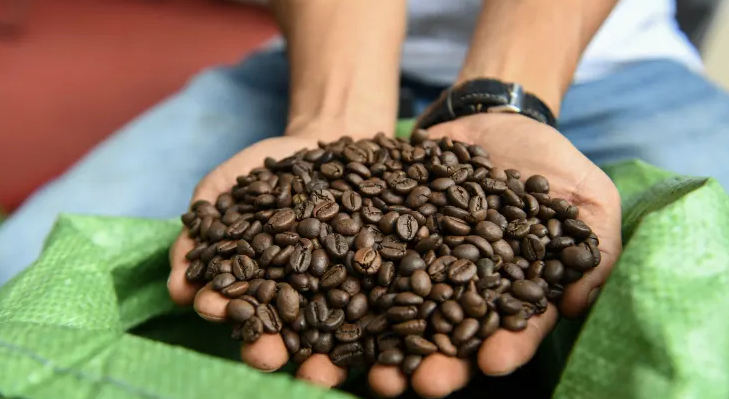November 25, 2025 | 23:58 GMT +7
November 25, 2025 | 23:58 GMT +7
Hotline: 0913.378.918
November 25, 2025 | 23:58 GMT +7
Hotline: 0913.378.918

A man holding Robusta coffee beans at a coffee tasting fair in Buon Ma Thuot city in Daklak province, Vietnam. Bitter and earthy. fit for instant brews only. Photo: AFP
“The now widely-expected transition to El Nino conditions in Q323 has stoked fears of reduced output in Vietnam and Indonesia, both major coffee robusta producers,” Fitch Solutions’ research unit BMI said in report dated May 24.
Robusta beans are known for their bitter characteristics and higher acidity, containing more caffeine than their premium and pricier arabica counterpart.
Brazil’s robusta crop has also been negatively impacted by drought as well, the report said.
That means the cost of instant coffee and espressos, which are often made with robusta beans, could come under pressure amid supply worries and a stronger than usual demand for robusta as consumers turn to cheaper substitutes for arabica.
El Nino is a weather phenomenon that typically brings hotter and drier than usual conditions to the central and eastern tropical Pacific Ocean. Climate scientists are predicting that this year’s El Nino could descend in the second half of 2023.
“Across Southeast Asia, El Niño conditions are associated with below-average rainfall and higher temperatures, both of which depress coffee production,” the BMI report said.
Vietnam, Indonesia and Brazil are the largest producers of robusta, according to the Food and Agriculture Organization.
“We draw attention to heavy rains in Indonesia through Q123, which have had a negative impact on coffee bean quality, with the USDA forecasting a decline of about one fifth in coffee robusta production,” the analysts said.
Carlos Mera, head of agri commodities markets at Rabobank, is forecasting a 10% drop in production to 11.2 million bags of robusta in the coming crop harvest.
In 2016, El Nino-related water shortages in both Vietnam and Indonesia led to a global production decline of close to 10%, according to the research unit’s statistics.
Typically, in an El Nino year, it is “not uncommon” for Vietnam and Indonesia to “see a 20% decline in production” in robusta beans, Shawn Hackett, president of commodity brokerage firm Hackett Financial Advisors, told CNBC.
“That would mean a pretty severe contraction of robusta,” he said.
Rising demand for the robusta
Robusta beans account for 40% of the world’s coffee production, and arabica beans make up the remaining 60% of global coffee production. Arabica beans are usually deemed to be of higher quality and command higher prices than robusta coffee.
However, global economic pressures are tipping demand toward robusta, the underdog of coffee beans.
Robusta prices are supported as coffee-product manufacturers and consumers substitute robusta beans for pricier arabica beans to save costs during inflationary times, the BMI report said.
Robusta coffee prices recently soared to a 15-year high of $2,783 per ton toward the end of May. They last traded at $2,608 per ton for July futures, according to data from the Intercontinental Exchange.
Additionally, the premium that arabica beans have over robusta beans plunged to the lowest since 2019 due to soaring demand for the relatively cheaper coffee bean.
“Asia, generally speaking, has taken a liking to robusta more so than arabica, and as such the demand for robusta is growing at a much faster rate than demand for arabica,” said Hackett.
He cited the lower price point of robusta beans in Asia and the population’s palette for robusta-bean based drinks.
Kopi, also known as Nanyang coffee, is a dark coffee beverage popular in Southeast Asia that’s traditionally brewed using robusta beans.
But Asia is not the only region that has taken an increased liking to robusta.
“While the reduction in washed arabica imports is partially due to lower availability … the shift to robusta shows that cheaper coffees are being heavily preferred by the European market,” said Natalia Gandolphi, analyst at HedgePoint Global Markets’ Intelligence.
Gandolphi said she expects a deficit of 4.16 million bags of robusta for the October 2023 to September 2024 period.
(CNBC)

(VAN) Brazil's COP30 presidency pushed through a compromise climate deal on Saturday that would boost finance for poor nations coping with global warming but that omitted any mention of the fossil fuels driving it.

(VAN) Poultry farmers in the UK have been warned that they could face one of the worst winters yet for bird flu.

(VAN) Prices of main-crop paddy have risen sharply, with jasmine rice hitting 16,100 baht per tonne — the highest level in years.

(VAN) In Brazil, FAO unveiled a series of reports and initiatives showing how sustainable agrifood systems are a solution to the climate crisis.

(VAN) With names like neodymium and dysprosium, rare-earth elements sound exotic — and their perceived scarcity has only added to the mystique.

(VAN) In a new study published in Trends in Biotechnology, researchers used a gene-editing technology called CRISPR to increase a fungus's production efficiency and cut its production-related environmental impact by as much as 61%- all without adding any foreign DNA.

(VAN) A top official in Beijing’s Cop delegation says China is committed to clean energy – but US’s absence is a problem.